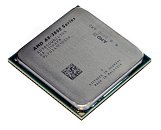- Joined
- Oct 9, 2007
- Messages
- 47,845 (7.39/day)
- Location
- Dublin, Ireland
| System Name | RBMK-1000 |
|---|---|
| Processor | AMD Ryzen 7 5700G |
| Motherboard | Gigabyte B550 AORUS Elite V2 |
| Cooling | DeepCool Gammax L240 V2 |
| Memory | 2x 16GB DDR4-3200 |
| Video Card(s) | Galax RTX 4070 Ti EX |
| Storage | Samsung 990 1TB |
| Display(s) | BenQ 1440p 60 Hz 27-inch |
| Case | Corsair Carbide 100R |
| Audio Device(s) | ASUS SupremeFX S1220A |
| Power Supply | Cooler Master MWE Gold 650W |
| Mouse | ASUS ROG Strix Impact |
| Keyboard | Gamdias Hermes E2 |
| Software | Windows 11 Pro |
Over-promising and under-delivering with its very first accelerated processing units (APU), codenamed "Llano," is coming back to haunt AMD, with a US District Court ruling that the company must face claims from investors over potential securities fraud. Launched in Q3-2012, AMD's A-series "Llano" APUs went largely unsold due to various factors including lack of product appeal, competition from Intel, forcing AMD to pull in its second-generation "Trinity" APU too soon. The related development first took shape in January 2014.
The swelling unsold "Llano" inventory forced an inventory writedown of $100 million, reducing the company's worth by nearly that much overnight, and tanking the value of the AMD stock. While AMD talked about the concept of an APU for years, Intel was the first to come out with a processor that integrates a graphics processor, with its Core i3 and Core i5 "Clarkdale" processors. The suit claims that AMD misrepresented production of "Llano" chips to its investors despite supply issues from its foundry partner GlobalFoundries, artificially inflating the value of the company in 2011-12. By the time production finally caught up, it ended up overproducing resulting in unsold inventory, and in consequence, the $100 million writeoff.

View at TechPowerUp Main Site
The swelling unsold "Llano" inventory forced an inventory writedown of $100 million, reducing the company's worth by nearly that much overnight, and tanking the value of the AMD stock. While AMD talked about the concept of an APU for years, Intel was the first to come out with a processor that integrates a graphics processor, with its Core i3 and Core i5 "Clarkdale" processors. The suit claims that AMD misrepresented production of "Llano" chips to its investors despite supply issues from its foundry partner GlobalFoundries, artificially inflating the value of the company in 2011-12. By the time production finally caught up, it ended up overproducing resulting in unsold inventory, and in consequence, the $100 million writeoff.

View at TechPowerUp Main Site







 We really need competition in the market.
We really need competition in the market.